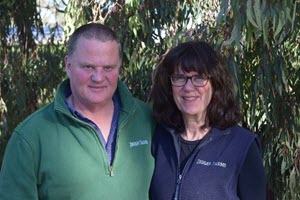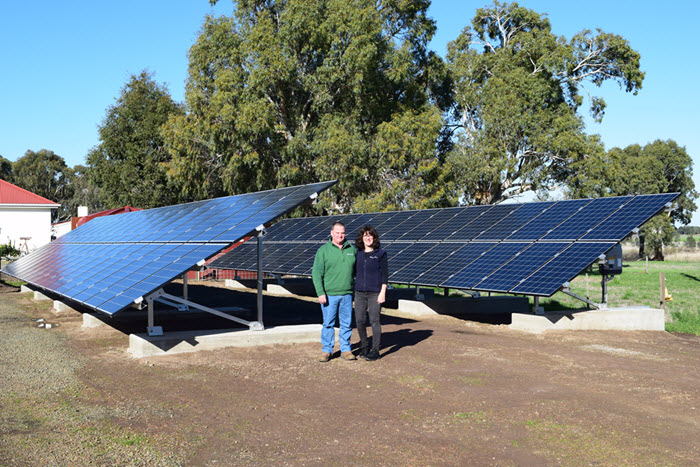Reducing carbon makes economic sense
Mark Wootton and Eve Kantor’s south-west Victorian grazing powerhouse is proof that high input, high output enterprises can promote world-class environmental stewardship.
 |
| Mark Wootton and Eve Kantor |
Mark and Eve co-founded the former Climate Institute, established to support climate change-related research and advocacy. They also run 25,000 Merino ewes and 300 Poll Hereford breeders on 3,378ha at Hamilton, Victoria.
It’s not surprising they were interested to see how their wool, lamb and beef business could operate in a ‘zero carbon’ global economy when approached by University of Melbourne researchers to participate in a study of offsets required to reduce the carbon balance on farms.
“We had serious concerns about the risk of climate change for an intensive system like ours, so we wanted to see if it was possible to produce carbon neutral food and fibre,” Mark said.
“The study showed us there is no silver bullet and reducing greenhouse gas emissions needs to be multi-layered, but it is possible to achieve carbon neutrality without compromising productivity.”
Mark and Eve have integrated tree plantings with grazing across their appropriately named ‘Jigsaw Farms’ – six properties totalling 3,378ha.
Since 1997, they have re-vegetated more than 600ha with indigenous trees and shrubs and timber species, for permanent environmental plantings and farm forestry (which will be replanted after being harvested).
Jigsaw Farms’ emissions from livestock, energy and transport are being offset by the carbon sequestered in these trees and soils.
The University of Melbourne study found that with 20% of the farm planted to trees, the stocking rates at Jigsaw Farms were carbon positive over a 25-year period.
The trees contributed to a 48% reduction in emissions between 2000 and 2014, and a 70% reduction to 2020.
The carbon sink provided by the trees has also allowed Mark and Eve to participate in carbon offsetting projects, including selling carbon neutral wool to an Italian fashion label, Quatha, through The Merino Company in 2009. Tree plantings offset 830 tonnes of carbon equivalents for 84 bales of wool.
They have also planted trees for Greenfleet, who were paid by third parties to offset their vehicle emissions.
The trees not only reduce the impact of climate change but provide shelter for lambing and, together with revegetated waterways, wetlands and well-managed pastures, contribute to an adaptive and resilient farming system.
“We’ve seen bird species increase from 47 to 159 species over the past 20 years – this biodiversity is a good indicator of a healthy production system,” Eve said.
Mark and Eve are also lowering their reliance on fossil fuel by installing solar panels at their house and sheds, solar pumps and using more efficient electrical pumps.
 |
| Mark and Eve installed solar panels across their property to decrease reliance on fossil fuel |
Productivity benefits
Eve and Mark used the Lifetime Ewe Management program to identify sheep profit drivers which can be employed for productivity and carbon benefits.
Mark and Eve moved towards carbon neutrality without compromising productivity and maintain stocking rates of 20–22 dry sheep equivalents (DSE)/ha, close to double the district average.
There is a carbon benefit in this approach – by improving the fecundity and feed conversion efficiency of their flock, Mark and Eve are also reducing methane emissions from livestock.
“Carbon sense makes economic sense” is Mark’s mantra.
Profit driver 1: lambing percentage
Mark and Eve run 25,000 Merino ewes; 40% are joined to terminal sires and 60% to Merino rams bred in their Jigsaw Farms stud.
They work with sheep consultant Dr Mark Ferguson to breed a true dual-purpose sheep and select for carcase traits such as muscle, as well as fertility-influencing traits including fat.
They want to lift lambing percentages from 100% (lambs weaned from ewes joined) to 120% through strategies such as:
- maintaining ewe condition score, with a target of 3 for joining and after weaning
- pregnancy scanning, so ewes with multiple lambs can be managed according to their higher nutritional requirements
- running optimum mob sizes of 150 for twinning ewes and 350 for single-bearing ewes during lambing.
Extra productivity is being achieved by joining 25–30% of ewe lambs.
“We were nervous about playing around with genetics in case our wool cut took a hit, but we now run ewes that are 5kg heavier and produce robust lambs, and the average micron has only gone from 18.2 to 19,” Mark said.
Profit driver 2: growth rates
Merino wethers are either retained on-farm for wool production or sold from locally processed Victorian abattoirs as chilled or frozen product into the Middle Eastern and North African market. Offspring from the first-cross program are directed to domestic processors.
The terminal flock lambs in June, and Mark aims to finish these lambs off grass within five months, before the dry summer hits. The Merino portion of lambs hit the ground in August and can be finished in an on-farm feedlot, if required.
“By improving genetics, we are improving feed conversion efficiency – we have seen the weight gains of these merino lambs lift from 200–220g/day to 300–330g/day.”
Profit driver 3: pasture utilisation
“Growing grass and managing it well is core to our business,” Mark said.
Grazing principles include:
- A balanced grazing system which receives an annual maintenance program of at least 0.8 units of phosphorus/DSE is used. They target an Olsen P of 20 and use soil analysis to identify any other element requirements, which are applied if the budget allows.
- A pasture renovation program is used with regular soil tests every five years and pasture analysis conducted by a soil nutritionist or agronomist. Pastures are perennial grasses that can capitalise on summer rainfall events (which are predicted to increase with climate variability), pastures that perform through the winter at low soil temperatures, and lucerne to be used strategically to reduce reliance on bought-in feed.
- Feed budgets to match demand to pasture growth. Containment paddocks, supplementary feeding and, if necessary, the feedlot, are used through autumn to protect pastures and maintain 100% ground cover all year round.
- Numerous shallow dams that had high evaporation rates have been replaced with deep-water storage dams which hold from 20 to 45 megalitres. Mark sees the lower evaporation rates as a win-win for the farm and the natural catchment.
“By improving pastures and ensuring water security, we have doubled the stocking rates on our land since we bought it, but still remain carbon neutral," he said.
Profit driver 4: animal welfare
Mark and Eve also strive for best practice animal welfare to maintain a healthy, efficient flock.
They started breeding clean-breeched sheep five years ago and now only 15% of their flock are treated with a breeching process to reduce the risk of fly strike.
“We use a cryogenic liquid treatment when undertaking the breeching process and these sheep have no set-back, in fact it adds $9/head in value to lambs in weight gain on its own, for a $3/head treatment," he said.
The carbon-paved road ahead
Mark would like to reach a stage where on-farm efficiencies mean Jigsaw Farms moves from carbon neutral to having excess carbon offsets to sell into the market.
“If producers undertook what we did in the past now, they would be able to enter into the carbon-offset market, or keep the credits to offset their own emissions as part of a branding or supply chain strategy,” Mark said.
“I believe carbon neutrality could be a point of differentiation for Australian producers in the international market.”
Information:
University of Melbourne research report: publish.csiro.au/AN/AN16438
Climate Institute: climateinstitute.org.au
Mark Wootton



